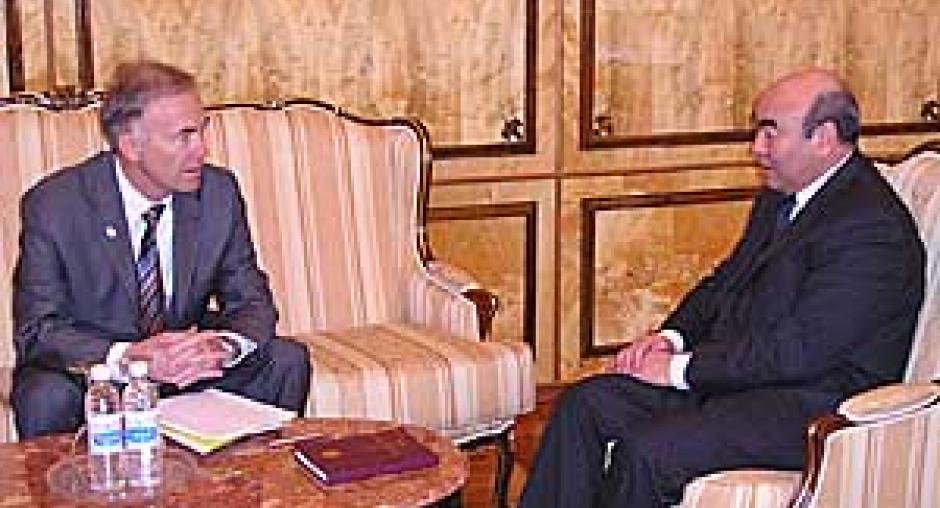Newsroom
Head of OSCE's office in Kyrgyzstan discusses police assistance programme with President Akayev
BISHKEK 19 March 2004

(President's Office)Head of OSCE Centre in Bishkek Ambassador Markus Mueller (left) meets with President Akayev of Kyrgyzstan, 19 March 2004. (President's Office) Photo details
BISHKEK, 19 March 2004 - The Head of the OSCE Centre in Bishkek, Ambassador Markus Mueller, today met Kyrgyz President Askar Akayev at Government House, where he outlined issues of special concern to the OSCE Centre in Bishkek.
These issues included realisation of a major OSCE Police Assistance Programme in Kyrgyzstan, the functioning of the OSCE Academy in Bishkek, OSCE support to the election process and criminal law reform.
Ambassador Mueller underlined the need to adapt the criminal procedure law, as well as to reform police law in Kyrgyzstan, in the context of the new phase of the Police Assistance Programme currently being implemented by the OSCE.
During its initial stage, the programme drew criticism from some elements of civil society over politically sensitive issues. In its second phase, police reform will focus on democratic policing and a radically new perception of police work.
"The police force in such a democratic state has to protect the constitution, the civil rights of citizens and maintain public order", said Ambassador Mueller.
President Akayev expressed his gratitude for the OSCE 's support in various other areas, such as elections, human rights, gender and media issues.
Special attention was paid to the OSCE Academy in Bishkek, as a regional and independent educational institution of international standard. The Academy has successfully established its basic infrastructure, completed concept and curricula development and started its training and post-graduate education activities.
The President pointed out that he would continue to work closely and support the OSCE Programme for further democratisation of society, adding that the Police Reform Programme and the OSCE Academy were very important steps in this direction.
These issues included realisation of a major OSCE Police Assistance Programme in Kyrgyzstan, the functioning of the OSCE Academy in Bishkek, OSCE support to the election process and criminal law reform.
Ambassador Mueller underlined the need to adapt the criminal procedure law, as well as to reform police law in Kyrgyzstan, in the context of the new phase of the Police Assistance Programme currently being implemented by the OSCE.
During its initial stage, the programme drew criticism from some elements of civil society over politically sensitive issues. In its second phase, police reform will focus on democratic policing and a radically new perception of police work.
"The police force in such a democratic state has to protect the constitution, the civil rights of citizens and maintain public order", said Ambassador Mueller.
President Akayev expressed his gratitude for the OSCE 's support in various other areas, such as elections, human rights, gender and media issues.
Special attention was paid to the OSCE Academy in Bishkek, as a regional and independent educational institution of international standard. The Academy has successfully established its basic infrastructure, completed concept and curricula development and started its training and post-graduate education activities.
The President pointed out that he would continue to work closely and support the OSCE Programme for further democratisation of society, adding that the Police Reform Programme and the OSCE Academy were very important steps in this direction.
